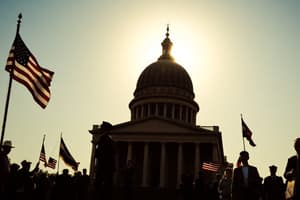Podcast
Questions and Answers
What was a significant outcome of the Spanish-American War?
What was a significant outcome of the Spanish-American War?
Which of the following was a key focus of the Populist Party?
Which of the following was a key focus of the Populist Party?
What was one effect of the Progressive Amendments?
What was one effect of the Progressive Amendments?
During World War I, which factor contributed to America's decision to enter the war?
During World War I, which factor contributed to America's decision to enter the war?
Signup and view all the answers
Which of the following best describes the terms of the Treaty of Versailles regarding Germany?
Which of the following best describes the terms of the Treaty of Versailles regarding Germany?
Signup and view all the answers
The Affluent Society of the 1950s is often associated with which of the following?
The Affluent Society of the 1950s is often associated with which of the following?
Signup and view all the answers
What was a major effect of the Iran Hostage Crisis?
What was a major effect of the Iran Hostage Crisis?
Signup and view all the answers
Which event is most closely associated with the policy of Détente during the Nixon administration?
Which event is most closely associated with the policy of Détente during the Nixon administration?
Signup and view all the answers
What social impact did the accumulation of wealth by industrialists have during the industrial era?
What social impact did the accumulation of wealth by industrialists have during the industrial era?
Signup and view all the answers
What was a major long-term consequence of the practices employed by industrialists?
What was a major long-term consequence of the practices employed by industrialists?
Signup and view all the answers
What drove the increased push for government regulation during the Progressive era?
What drove the increased push for government regulation during the Progressive era?
Signup and view all the answers
How did technological advancements during the industrial era impact American society?
How did technological advancements during the industrial era impact American society?
Signup and view all the answers
What does the term 'Robber Baron' signify in discussions about industrialists?
What does the term 'Robber Baron' signify in discussions about industrialists?
Signup and view all the answers
What was one of the primary benefits of industrialization in the United States?
What was one of the primary benefits of industrialization in the United States?
Signup and view all the answers
Which of the following was a negative effect of the economic practices of robber barons?
Which of the following was a negative effect of the economic practices of robber barons?
Signup and view all the answers
How did robber barons influence the political landscape?
How did robber barons influence the political landscape?
Signup and view all the answers
What is a characteristic of monopolies created by robber barons?
What is a characteristic of monopolies created by robber barons?
Signup and view all the answers
Which industry was Andrew Carnegie associated with during the robber baron era?
Which industry was Andrew Carnegie associated with during the robber baron era?
Signup and view all the answers
What was the public perception of robber barons in historical discussions?
What was the public perception of robber barons in historical discussions?
Signup and view all the answers
What was a common argument in favor of the actions taken by robber barons?
What was a common argument in favor of the actions taken by robber barons?
Signup and view all the answers
What was one of the consequences of the practices of robber barons on worker conditions?
What was one of the consequences of the practices of robber barons on worker conditions?
Signup and view all the answers
Flashcards
Robber Barons
Robber Barons
Industrialists in the late 19th century who accumulated immense wealth through often questionable business practices.
Populist Party
Populist Party
A political party in the late 19th century representing farmers and laborers, advocating for reforms like free coinage of silver.
American Imperialism
American Imperialism
The policy of extending American political, economic, and cultural influence beyond its borders.
Progressive Amendments
Progressive Amendments
Signup and view all the flashcards
World War I
World War I
Signup and view all the flashcards
Treaty of Versailles
Treaty of Versailles
Signup and view all the flashcards
Cold War
Cold War
Signup and view all the flashcards
Cuban Missile Crisis
Cuban Missile Crisis
Signup and view all the flashcards
Social Impact of 'Robber Barons'
Social Impact of 'Robber Barons'
Signup and view all the flashcards
Long-Term Consequences
Long-Term Consequences
Signup and view all the flashcards
Regulation and Response
Regulation and Response
Signup and view all the flashcards
Technological Advancement
Technological Advancement
Signup and view all the flashcards
Legacy of the Label
Legacy of the Label
Signup and view all the flashcards
Industrialization's Impact
Industrialization's Impact
Signup and view all the flashcards
Economies of Scale
Economies of Scale
Signup and view all the flashcards
Monopolies and Price Fixing
Monopolies and Price Fixing
Signup and view all the flashcards
Political Influence of Robber Barons
Political Influence of Robber Barons
Signup and view all the flashcards
Examples of Robber Barons
Examples of Robber Barons
Signup and view all the flashcards
Debate on Robber Baron Label
Debate on Robber Baron Label
Signup and view all the flashcards
Impact on Society
Impact on Society
Signup and view all the flashcards
Study Notes
History 1302 Final Exam Study Guide
- Exam Format: Comprehensive, in-class, no notes allowed. Section 1 & 2 cover 50 multiple choice questions (1 point each) and 10 matching questions (1 point each).
Unit 1 (Chapters 16-20)
- Robber Barons: Individuals and their industries
- Populist Party: Political party
- Westward Migration: Group migrations and government acts encouraging it, and its impact on the environment.
- Imperialism (1800s): Specific examples of American expansionism.
- Theodore Roosevelt: Progressive policies
- Progressive Amendments: Details of those amendments.
- Woodrow Wilson: Policies
- Election of 1912: Candidates and outcomes.
- Women's Suffrage: Key figures/players.
- Temperance and Prohibition: Impact and effects.
Unit 2 (Chapters 21-24)
- World War I: Causes, alliances (Entente/Allies), reasons for American entry, American contributions, Treaty of Versailles (terms on Germany, US rejection).
- Roaring Twenties: New products, Dawes Plan, social impact of automobiles.
- Great Depression: Causes and initial responses.
- World War II: Alliances, key events ("turning points"), atomic bombing of Japan.
Unit 3 (Chapters 25-30)
- Early Cold War: Focus on policies of Truman and Eisenhower, UN structure.
- Berlin Blockade: Details about the blockade.
- McCarthyism/2nd Red Scare: Details
- 1950s Culture: Details, including new products and entertainment.
- JFK: Bay of Pigs and Cuban Missile Crisis
- LBJ: War on Poverty, The Great Society.
- Vietnam War: Origins, American involvement under LBJ and Nixon.
- Richard Nixon: Triangular Diplomacy, Watergate Scandal.
- Israel: Diplomacy.
- Iran Hostage Crisis: Details about the crisis.
Section 3 (Map)
- Map Focus: Understanding locations of American states gained through the Mexican Cession and their approximate locations in the Middle East. (Exact locations required.)
Section 4 (IDs/Short Answer)
- Format: Essays (approx. 1-2 pages) on 3 assigned IDs explaining who (players), what (event definition), where (location), when (time frame), and why (significance).
Studying That Suits You
Use AI to generate personalized quizzes and flashcards to suit your learning preferences.
Related Documents
Description
Prepare for your History 1302 final exam with this comprehensive study guide. Covering key topics from chapters 16-24, it'll help you understand significant events, figures, and policies from the late 19th century to World War I. Review essential concepts like the Robber Barons, women's suffrage, and American imperialism.




